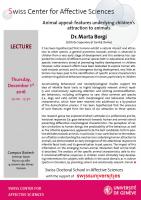
Talk Borgi (Lecture Series)
01.12.2016 14:00 – 15:30
Animal appeal: features underlying children’s attraction to animals
It has been hypothesized that humans exhibit a natural interest and attraction to other species. A general proneness towards animals is observed in children from a very early stage of development and this evidence has supported the inclusion of different animal species both in educational and therapeutic interventions aimed at promoting healthy development in children. However, while research efforts have been dedicated to explore human attitude towards animals, and its emergence during development, very little attention has been paid to the identification of specific animal characteristics underpinning distinct behavioral responses in humans, particularly in children.
Accumulating behavioural and neurophysiological studies support the idea of infantile facial traits as highly biologically relevant stimuli rapidly and unconsciously capturing attention and eliciting positive/affectionate behaviours, including willingness to care. Most common pet species (i.e., dogs and cats) exhibit both morphological and behavioral infantile characteristics, which have been retained into adulthood as a by-product of the domestication process. It has been hypothesized that the presence of such features might form the basis of our attraction to these species.
Our research group has explored children’s attitudes (i.e. preferences) and behavioural responses (i.e. gaze behaviour) towards human and animal stimuli presenting differential morphological characteristics. The perception of certain similarities to human beings, the predictability of the behaviour, as well as the infantile appearance, appeared to be the best candidates to form positive attitudes towards animals. In particular, in our contribution to the endeavour of better understanding the mechanisms underlying human attraction to animals, we demonstrated an early emergence of the attentional response to infantile facial traits and its generalization to pet species. The impact of this information on the emerging human-animal interaction field will be briefly described. The analysis of the specific animal characteristics able to elicit emotional/affiliative responses in children could ultimately help developing interventions for subjects with deficits in the social domain, as in Autism Spectrum Disorders, by providing salient and emotionally relevant stimuli.
Lieu
Bâtiment: Campus Biotech
Seminar Room
H4-02 232.080
Organisé par
Centre interfacultaire en sciences affectives (CISA)Intervenant-e-s
Marta Borgi, Section of Behavioural Neuroscience, Istituto Superiore di Sanità, Rome, Italyentrée libre
Classement
Catégorie: Séminaire
Plus d'infos
Contact: missing email
Fichiers joints
| Talk Borgi.pdf | 150.1 Kb |

 haut
haut